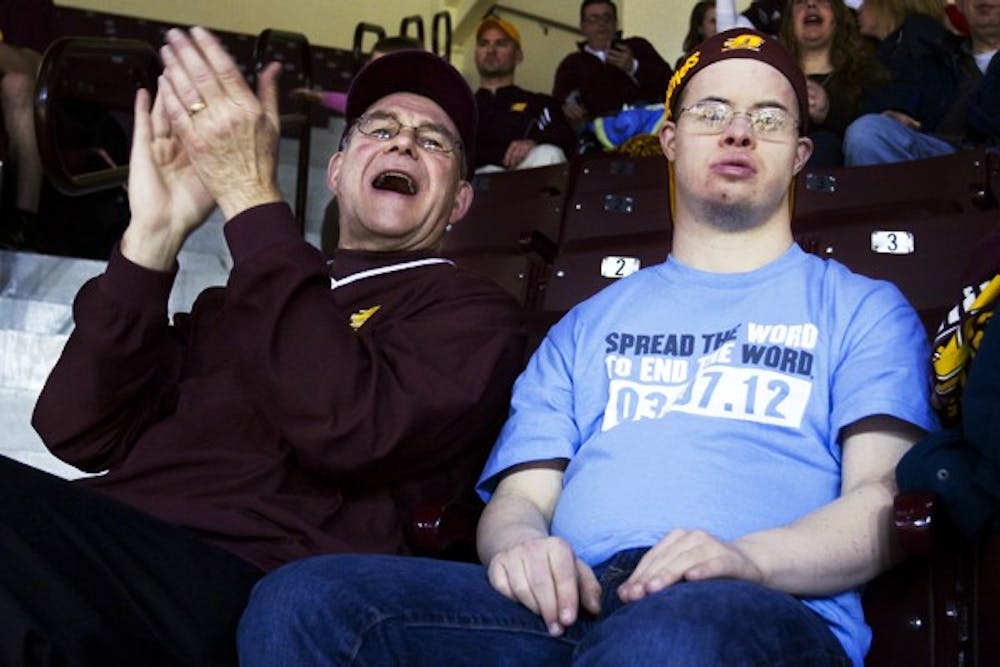Spread the Word to End the Word campaign launches its fourth year, SAAC promotes movement at basketball games

Across the world people are using their voices to advocate for people with intellectual disabilities during the fourth annual Spread the Word to End the Word campaign.
The campaign's founders, Soeren Palumbo, who was a student at Notre Dame, and Tim Shriver, attending Yale, teamed up in the summer of 2008 to launch the movement while interning at the Special Olympics office in Washington D.C.. Their goal was to encourage people to stop using the words "retard" and "retarded."
"We wanted to tap into the power to affect change that college students have," Palumbo said.
The campaign has since gained the support of 40 colleges and universities and as well as dozens of high schools and elementary schools, Palumbo said. It has now spread to every continent besides Antarctica.
“Intellectual disability is something that doesn't know a race, doesn’t know a color and comes in every single community,” he said.
Palumbo said his younger sister who has intellectual disabilities inspired him to start the campaign with Shriver.
“One of my responsibilities as a big brother is to make the world a better place for her to live in,” Palumbo said. “When I grew up, I realized the social stigma associated with people with intellectual disabilities is incredibly complicated but in a lot of cases it's still crystallized into the words ‘retard’ and ‘retarded’ which serve as a short hand in a lot of ways to communicate that discrimination and that stereotype of people with intellectual disabilities as clumsy, as hopeless and as worthless.”
Although the national day of awareness was March 7, the CMU Student-Athlete Advisory Committee joined with Special Olympics to raise awareness in the Mount Pleasant community during the week prior's basketball games.
Several Special Olympics athletes donned blue campaign shirts and were honored on the McGuirk Arena court holding the banner signed by people who pledged.
Clare resident and mother of a Special Olympics athlete, Enette Wilson, said she appreciates what CMU is doing for the campaign.
“It’s a nice thing to have these kids come out,” she said. “You guys do a good job when the Special Olympics come and I don’t have any fear that my kid is there for the entire week.”
Enette's son Billy, who was attending his first CMU basketball game, said his favorite Olympics game was snowshoeing in Traverse City.
A Spread the Word to End the Word banner is hung up in the team locker rooms for all CMU athletes to sign, said junior field hockey player Erin Dye.
“If someone accidentally says the word ‘retarded,’ we will correct each other, and there’s more awareness after people sign the banner opposed to before,” the Missouri native said.
Special Olympics Senior Manager of Social Media Ryan Eades said most of the Special Olympics athletes find this a positive movement.
“They’ve dealt with stigma and prejudice and all kinds of stuff their entire lives, so for them to rally around a message of respect and inclusion is something they’re extremely excited about and extremely excited to advocate for,” he said.
Since the campaign website’s inception in 2008, more than 247,000 have pledged on www.r-word.org to stop saying the word.
Palumbo said on March 7 that number grew by about 35,000 new pledges.
The movement makes the world a better place not only for those with mental disabilities but also for those who pledge, he said.
“If you rearrange your thinking about people with disabilities this way, it will enable you to engage in this extraordinary self-enriching relationship with intellectual disabilities and be able to have that source of self-improvement in your life,” he said.
Palumbo and Shriver's goal for the campaign now is for it to flourish beyond just signing the banner and for people to utilize it as a gateway for understanding people with intellectual disabilities.
"We want this to be a much richer campaign about moving away from stereotypes to a more understanding inclusive campaign about people with intellectual disabilities," Palumbo said. "People can take the pledge then volunteer with Special Olympics or just become more sensitive toward people with intellectual disabilities. It is the first step toward a deep life change and deep perception change for people with intellectual disabilities"



